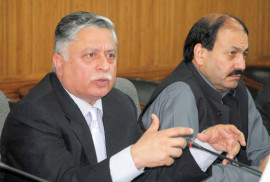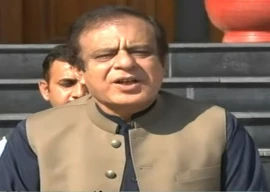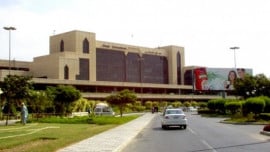
KARACHI: Setting aside its fixation with reducing fiscal deficit, the government should adopt a job-rich growth strategy in the upcoming budget, speakers said at a pre-budget seminar on Wednesday.
Each of the three economists who addressed the seminar at the Applied Economics Research Centre (AERC) at the University of Karachi called on the government to do away with austerity measures that are supressing economic growth.
Path to progress: Economy improving due to govt policies, says governor
“The stabilisation-first mantra has lost its charm. The economy is in the deficient demand mode … the anti-growth prescription of the International Monetary Fund (IMF) has damaged growth potential,” said Dr Ashfaque Hasan Khan, dean of the NUST School of Social Sciences and Humanities who held key positions in the finance ministry in the Musharraf government.
The IMF is generally accused of forcing governments to cut subsidies, privatise state-owned enterprises and adopt austerity before agreeing to lift them out of looming balance-of-payments crises. IMF bailouts typically require a cut in government spending to bridge the gap between revenues and expenditure, also known as fiscal deficit. A drastic cut supresses GDP growth in the short term at least, helping fiscal authorities meet the IMF target of budget deficit.
Our fiscal policy design must change, Khan said, noting that people of Greece have paid a heavy price for accepting the fiscal path that the IMF had chosen for them. Saying that the scope of fiscal correction during an economic downturn is limited, Khan added that an economic boom is the appropriate time to introduce austerity measures.
Pakistan is world’s seventh most restrictive and protected economy'
Noting that GDP growth will offset the consequent surge in fiscal deficit, he added the proposed fiscal policy must include an increased developmental role.
Khan spent a major part of his presentation on proving that Ishaq Dar-led ministry of finance is fudging national accounts to paint a flowery picture of the economy for the IMF. From the GDP growth rate to budget deficit, inflation and revenue collection figures, Khan said Dar has manipulated all major economic indicators to deceive the IMF as well as the general public.
He said the provinces have a “perverse incentive” against spending the huge resources that they now receive every year from the federal government post-18th Amendment. “It’s been a complete disaster,” Khan said while referring to the devolution of subjects like education and health from the centre to provinces.
Issue of taxes
Speaking on the occasion, Research Institute of Islamic Banking Chairman Dr Shahid Hasan Siddiqui said the government must collect taxes on income beyond a certain limit regardless of its source. Referring to remittances and real estate as two avenues where the “rich and powerful” get their black money whitened, Siddiqui said the documentation of the economy should begin with making the national tax number mandatory for carrying out any big transaction.
He added that fiscal policy is not in harmony with monetary policy, which is hurting economic growth. Monetary policy is determined and implemented by the State Bank of Pakistan (SBP) through different tools, such as interest-rate targeting, to manage inflation and outstanding credit in the economy. “Even the banking policy and monetary policy of the SBP contradict each other,” Siddiqui said, explaining that the former encourages banks to make risk-free investments while the latter aims to increase private-sector credit.
Pakistan's economic output rising at healthy pace
Addressing the participants, Collective for Social Science Research Director Dr Asad Sayeed said the government should play a far more active role in expanding the size of the economy to ensure inclusive and equitable growth. “The public sector will have to be the driver of economic growth,” Sayeed said.
According to a recent study conducted by economist Amjad Ali, the public sector had a “very high share” (up to 10%) in total investment until the early 1990s. But its share has declined since then by almost half because of increasing fiscal constraints emerging from a low tax-to-GDP ratio and meagre external financing that hardly allows for government spending on development programmes, the study says.
Sayeed said inequality has been rising in Pakistan, although the Gini coefficient - which is the main measure of inequality - shows otherwise. He said people in the upper-income brackets understate their wealth, which creates the false impression about the state of inequality.
Published in The Express Tribune, May 12th, 2016.
Like Business on Facebook, follow @TribuneBiz on Twitter to stay informed and join in the conversation.



































1713509570-0/Taylor-Swift-Album-Release-(1)1713509570-0-270x192.webp)






















COMMENTS
Comments are moderated and generally will be posted if they are on-topic and not abusive.
For more information, please see our Comments FAQ